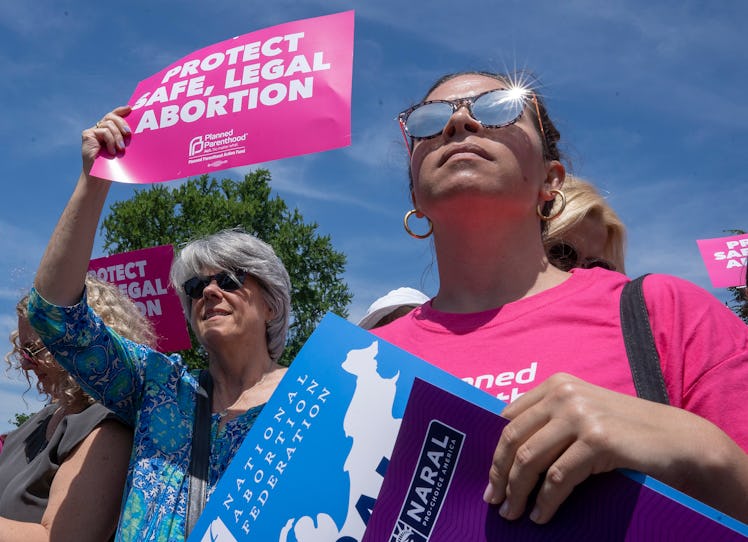
Alabama's Abortion Ban Has Been Blocked, & Here's What Happens Now
Back in May, Alabama lawmakers passed one of the strictest abortion laws to date, banning abortion at any stage of pregnancy without any exceptions in cases of rape or incest. The law would have gone into effect on Nov. 15, but thanks to a federal judge, Alabama's abortion ban has been blocked temporarily. So, what happens next?
On May 15, Alabama Gov. Kay Ivey signed a near-total abortion ban into law. The law bans abortion in almost every case, with the only exception being if the life of a pregnant person is in danger, and also makes performing an abortion punishable by up to 99 years in prison. Less than two weeks after Ivey signed off on the law, reproductive rights organizations like Planned Parenthood and the American Civil Liberties Union sued the state of Alabama for violating Roe v. Wade's protections on abortion.
And this week, on Oct. 29 — less than three weeks before the law was slated to go into effect — U.S. District Court Judge Myron Thompson issued a temporary injunction against the Alabama abortion ban. This injunction "shall remain in effect until this court resolves the case in full," Thompson said, per Politico. Alabama Attorney General Steve Marshall said in an Oct. 29 statement that the ruling in the case "was not unexpected," per CBS News.
Here's what that means: Alabama residents can still legally access abortion for now, at least until their state's abortion ban makes its way through the courts. In his 17-page opinion defending his ruling to block Alabama's abortion ban, Thompson judged that enforcing the law would cause "serious and irreparable harm."
"A near-total ban imposes substantial costs on women, including those who are unable to obtain an abortion and those who 'desperately seek to exercise their ability to decide whether to have a child' and thus 'would take unsafe measures to end their pregnancies,'" Thompson wrote, quoting the 2014 Alabama abortion case Planned Parenthood Southeast, Inc. v. Strange.
Importantly, this move may ultimately be just what anti-abortion advocates are hoping for. Marshall suggested that the injunction would set off a court battle that could ultimately go to the Supreme Court, and potentially give the court a chance to overturn abortion rights case Roe v. Wade, which guaranteed the right to abortion under federal law.
"As we have stated before, the State's objective is to advance our case to the U.S. Supreme Court where we intend to submit evidence that supports our argument that Roe and Casey were wrongly decided and that the Constitution does not prohibit states from protecting unborn children from abortion," Marshall stated.
Nevertheless, reproductive rights advocates celebrated Thompson's injunction on Tuesday. Planned Parenthood's acting president, Alexis McGill Johnson, noted that "today’s victory means that people can still access the health care they need across Alabama — for now," while Randall Marshall, the executive director of the ACLU of Alabama, criticized the state for putting such a heavy burden on its taxpayers.
“The state’s repeated attempts to push abortion out of reach by enacting unconstitutional laws restricting abortions have already cost taxpayers nearly $2.5 million," Randall Marshall said in a statement, per The New York Times. "This ill-advised law will cost taxpayers more money.”
Now that Thompson has issued a preliminary injunction against Alabama's restrictive abortion ban, the case will make its way through the courts. It is not yet clear whether it will make it all the way to the Supreme Court, but you can be sure that reproductive justice advocates will be fighting this legislation at every turn, just as they have done in numerous other states.